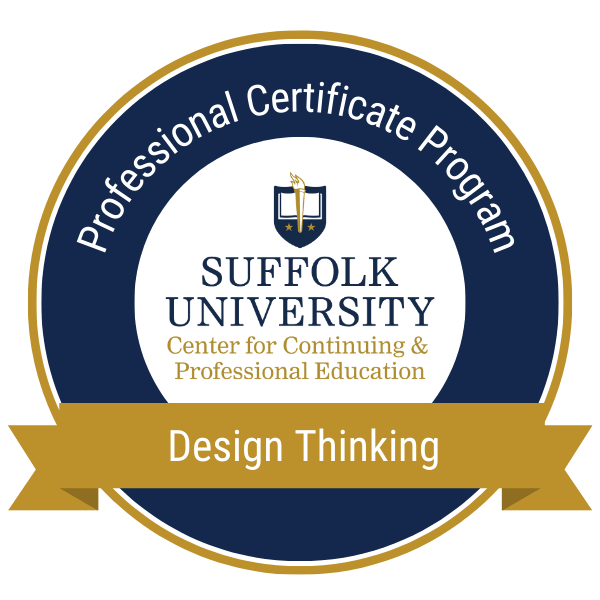Design Thinking: Applying Discovery
and Innovation in Practice
Earn a Certificatefrom Suffolk University CCPE. Register Now - Payment Plans Available!
START
May 13, 2024. Register by May 8, 2024.
DURATION
8 weeks. From May 13, 2024 – July 7, 2024.
COST
NOW $899. Payment plans are available.
FORMAT
DESIGN THINKING: APPLYING DISCOVERY AND INNOVATION IN PRACTICE
Build new skills. Develop new competencies. Think more creatively to create value.
The concept of design thinking has long been associated exclusively with professionals who develop new products or solve technical problems. Nothing could be further from the truth. Design thinking is a set of widely-applicable, in-demand skills that are useful for an individual or team to creatively, effectively, and efficiently meet the ever-changing needs of customers.
Design thinking provides a framework that helps identify and define complex organizational problems to develop innovative solutions. Through a series of non-linear phases, identify what users (customers) really want, not what we think they want. Learn to challenge existing assumptions to help conceive of and develop viable, effective new solutions. Iterate using prototyping to test solutions based on users’ feedback to make appropriate modifications that enhance their experiences. Design thinking can address the demands of users across a wide range of industries and functions including tech, health care, education, consumer products, marketing, customer service, and not-for-profit entities.
Why Earn a Design Thinking Certificate?
Design Thinking encourages individuals to think creatively and come up with innovative solutions. Some of the skills that are developed through design thinking include:
- Problem Framing: Design thinking promotes a mindset of experimentation and iteration. By embracing curiosity, embracing ambiguity, and challenging assumptions, you can foster a culture of innovation and creativity.
Skills Acquired: ideation, brainstorming, identifying the root causes of problems, reframing challenges as opportunities, and defining problem statements that address the underlying needs of users. - Collaboration and Team Work: Design thinking encourages collaboration and interdisciplinary teamwork. By learning design thinking, you can enhance your ability to work effectively in teams, leverage diverse perspectives, and foster a collaborative and inclusive work environment.
Skills Acquired: effective communication, teamwork, and collaboration across different perspectives and expertise. - Creative Problem-Solving: Design thinking fosters a mindset of creative problem-solving by encouraging individuals to think beyond traditional solutions
Skills Acquired: divergent thinking, exploring multiple possibilities, and finding unique approaches to solve complex problems. - User-Centered Design: Design thinking emphasizes designing solutions that meet the needs and preferences of users
Skills Acquired: empathy, active listening, observing, and gaining a deep understanding of user needs and experiences, research, persona development, and creating user-centered experiences that resonate with target users. - Prototyping and Iterative Testing: Design thinking emphasizes building prototypes as a way to test and iterate on ideas and promotes a culture of experimentation and learning from failure.
Skills Acquired: rapid prototyping, quick testing and feedback, openness to risk. - Visualization: Design thinking encourages individuals to visualize ideas and concepts to communicate effectively.
Skills Acquired: visual communications, prototyping, storyboarding, and using visual aids to convey ideas and concepts. - Adaptability: Design thinking equips individuals with the skills to adapt and respond to changing circumstances. By focusing on iteration, and prototyping, you can develop a flexible and adaptable approach to problem-solving.
Skills Acquired: embracing ambiguity, quickly adapting to new information, and adjusting plans and strategies based on user feedback and insights.
Benefits of Suffolk CCPE’s Design Thinking Certificate
Divergent Thinking
Apply creative, novel approaches to solving complex problems to spur innovation and encourage unique solutions.
Personal Growth
Practice empathy, develop processes to visualize problems to find themes and patterns, learn to embrace risk and failure, and practice your creativity.
Real Solutions
Apply design thinking principles as a team to solve a real-world problem in real-time.
Meaningful Collaboration
Much of work today is completed in teams, and often in remote teams. Develop connections with a diverse group of peers in an online environment.
Increase Your Marketability
Study after study shows that companies of all sizes and industries are looking for individuals who can think creatively to solve problems, work effectively in teams, are capable of applying knowledge to novel situations and willing to take risks!
LEARN MORE
Take a Self-Guided Tour
Are you interested in getting a preview of the certificate modules in our online learning platform? Take a self-guided tour through the platform to gain a better understanding of the content, structure, assignments, interactivity, navigation, and much more! You will not have to sign up or login to take the tour.
Learning Outcomes
By earning a design thinking certificate online, you’ll be able to:
Explain why the design thinking methodology can benefit businesses.
Assess the models and tools of design thinking.
Design a solution to a consumer challenge using the methods and tools of design thinking.
Synthesize feedback in order to update a solution to better meet consumer needs.
Apply your design thinking knowledge to your work as a professional by explaining how it might benefit a future business opportunity.
Assess users’ characteristics related to a challenge in design.
Feedback: From Instructor
Certificate Length: 8 Weeks
Get Started: May 13, 2024
Format: Fully Online
Total Cost: NOW $899
Live Sessions: Interact with Faculty & Students
Time Commitment: 4 Hours/Week
Credential: Digital Certificate
Easy Registration: No Application Process
Feedback: From Instructor
Certificate Length: 8 Weeks
Get Started: Sept. 18, 2023
Format: Fully Online
Total Cost: $1299
Live Sessions: Interact with Faculty & Students
Time Commitment: 4 Hours/Week
Credential: Digital Certificate
Easy Registration: No Application Process
Design Thinking Certificate Curriculum
Each module of the certificate in design thinking will introduce you to a new foundational element of the design thinking process. The modules will use an inverted pyramid style of progression, beginning with a comprehensive overview of design thinking and getting more refined and specific as you progress through the certificate. Each module lasts about two weeks and includes discussion posts, downloadable tools to use on the job, and optional live sessions to connect with peers and the course instructor.
Module 1: What Is Design Thinking?
Module 2: Observe, Understand, and Create Empathy
Module 3: Reframe Concept Statement, Ideate, and Prototype
Module 4: Implementation, Evaluation, and Wicked Problems
Who Should Enroll?
Designers
Entrepreneurs and business professionals
Educators
Engineers and technologists
Healthcare professionals
Non-profit organizations and social entrepreneurs
Earn a Certificate in: Design Thinking
If you are interested in this certificate but have additional questions, please fill out this form!
Meet the Faculty
Shari Worthington
Dr. Worthington’s interests lie in both research and practice. She is a serial entrepreneur with over 25 years experience in management and marketing in the technology industries. She works with startups as well as Fortune 500 firms, including Apple, Raytheon, Rogers Corp., Honeywell, and MKS Instruments. She is an international speaker on the topics of business model strategy, commercialization strategies, product management, search marketing, social media, and B2B marketing.
Dr. Worthington’s academic research focuses on entrepreneurial decision-making at the intersection of strategy, entrepreneurship, and psychology. Specific interests include business model innovation, founder identity, and entrepreneurial marketing.
Dr. Worthington on Teaching: “The college classroom offers students a unique, low risk opportunity to learn from success and failure – exploring new ideas, gathering feedback, modifying strategies, and trying again with a better plan. All my courses combine research-based theory and practical experience with the goals of: (a) creating opportunities for students to work outside their comfort zones and learn from in-class successes AND failures; (b) helping students learn to be more adaptable and spontaneous…to deal with the fuzzy edges that surround most of life, especially in business; (c) encouraging students to understand multiple points of view and more effectively communicate.”
Patrick Laughran
Patrick Laughran is an entrepreneur, information systems professional, and educator. His experience as a leader and practitioner working at the intersection of product and service design, information systems management, and business strategy has been accumulated during a career that includes executive level positions at for profit and non-profit institutions where he led numerous large-scale initiatives, product design and development teams, and service organizations. Patrick is the former founding Chief Technology Officer of two successful entrepreneurial ventures; WebCT which was sold for $180 million in 2006 and TechTarget which went public with a $100 million IPO in 2007 (NASDAQ: TTGT). He is currently a Chief Information Officer with over 30 years of experience as an information systems professional. Mr. Laughran is also an educator teaching a range of undergraduate, graduate, and certificate courses on innovation, information systems, management, and business strategy since 2007. He holds an MBA from Babson College and a BSBA from Northeastern University.
Patrick Laughran’s professional areas of interest include the transformational capabilities of evolving technologies, the interrelationships between human beings and information technologies, and innovation as a driver of enterprise growth. He also is an avid bird photographer, outdoor enthusiast, and enjoys the company of his family including two dogs where he resides in Massachusetts.
Frequently Asked Questions
How will a certificate benefit my career?
The certificate in Design Thinking can help you upskill, so you can stay at the forefront of your industry. By gaining relevant knowledge and skills, you can grow in your current role, advance into more senior positions, or change your career.
How long will it take to complete the Design Thinking certificate?
You can complete a full certificate in 8 weeks.
How can I enroll for the Design Thinking certificate?
The certificate is open enrollment. You can sign up with our online registration system to submit payment and reserve your spot.
How much does the Design Thinking certificate cost?
You can earn the Design Thinking certificate online for $899.
What is a professional certificate equivalent to?
Certificates are professional credentials that show you have completed a certain level of education or training for a subject or career discipline.
Build Creative Problem-Solving Skills Through Conceptual and Practical Exploration.
All Suffolk certificates, including the design thinking certificate, are noncredit and offer open enrollment. That means no application or lengthy admission process. Simply use our online registration system to sign up!
Please note that payment plans are available. Email us at ccpe@suffolk.edu for more information.
Your Digital Credential Awaits
Upon completion of the Design Thinking certificate program, you will earn a Suffolk University Center for Continuing & Professional Education branded digital certificate.
Your new Design Thinking Certificate will allow you to represent your skills and share your abilities online in a way that is simple, trusted and can be easily verified in real time. Digital credentials and certificates provide employers and peers concrete evidence of what you had to do to earn your credential and what you’re now capable of! Our Credly partnership page has a wealth of information on your new credential and how you can easily use and share it to show off your new skills.




